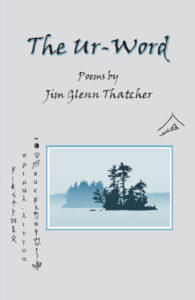The Ur-Word
 The Ur-Word,
The Ur-Word,
by Jim Glenn Thatcher,
Moon Pie Press, 2008,
33 pages, paper, $9.00, ISBN: 978-1-60643-189-4
Jim Thatcher recites his poems with a mesmerizing, cantorial tenor voice. I have witnessed the arc of his art over two decades: as friend, teaching colleague, and member of the same writing workshop. A reading of his Moon Pie Press chapbook, The Ur –Word, assures me that his “voice” has heightened in poetic pitch — like an instrument fine-tuned, its timbre is idiosyncratic — in the best possible sense.
For Thatcher is, to use jazz lingo, “a deep cat.” From the author’s notes: “He has never lost his deep interest in literature, philosophy, and the idea(s) of history, both natural and human.” This is a fair assessment, but readers will also mine valuable nuggets of astronomy, astrology and mythology. Hence, the The Ur–Word (the first or original word) explores the origins of these histories — and of language itself — as applied to Thatcher’s own consciousness.
He sets out to capture what he calls “the endless epiphany of existence” (“Interlinear,” page 4), and succeeds admiringly. Safe to say, Jim’s is a “poetry of ideas”: reflecting not his ego but an enormous trove of learning. While it might be tempting — given this capacity — to veer into abstraction, Thatcher nicely pairs off his concepts with concrete, sensual details. Take the following passage from “Ice Night.”
Time itself seemed frozen into Presence —
An energy congealed, and taut with brittle tension.
No wind blew and no thing moved,
And only sound seemed living:
Old pines cracked like pistols in the woods, and
On the lakes the pressure of the ice reached crystal mass
To split against itself
In lightning fissures cracking out . . . (20)
Thatcher also reveals a savvy balance when it comes to sentence structure. There are many short, pithy fragments. These add “punch,” playing against longer sentences ably broken up with commas, semicolons, and colons.
Such long phrases dominate the ambitious title poem (two-and-a-half pages in length). Someone of a more limited imagination might have “channeled” the Gospel of John (“In the beginning was the Word . . . . ); but Thatcher begins by predating Genesis!
Before the beginning there was No Thing; not time, nor light, nor space:
A formlessness without measure; neither great nor small, nor finite
nor infinite, and from that no-thing formed one atom, the egg of
existence: matter imagining itself into being, and within that atom
curled the Ur-Word . . . . (23)
Here, and in the phrases to come, Thatcher is at his most lyrical with the repetitive devices of rhetoric. But he doesn’t lapse into rhetorical cant. It’s an hypnotic poem, deserving to be the centerpiece of this chapbook.
The overall structure of The Ur–Word — the book — is well-paced, preparing us for this grand, sometimes allusive poem. The book sagely starts at its most accessible; but towards the end there are three poems with footnotes — leading readers into a rarified “trifecta” — that of a Greek philosopher of mathematics, later a back-to-back pair of poems addressing two ancient Asians. (This reader would have appreciated more footnotes elsewhere, as well.) However, The Ur–Word, even if sometimes a challenging “read,” more than rewards any effort required to do so — with its depth of material, by the poet’s generosity — in sharing his erudition in such musically-phrased language.
This book review would be remiss not to mention the wry comedy imbedded throughout this work. “Sanding Blue Doors” (6-7) is “an outright hoot” in its comparing the sanding of blue paint as creating clouds and constellations in the poet’s mind. I also enjoyed the beginning of “Different Waters Flowing” (15). “The third person: He realizes again / how he likes to think of himself this way, / knowing it’s a ruse. Closing the I and opening the eye.” Yet, appropriately enough, Thatcher saves his best comic lines for the title poem itself: “Ur delights in the jealous arrogance of the poet, who sings Ur’s / praises as though Ur was for poets alone. Ur gets the joke, and it / isn’t on Ur.” Man, am I jealous of that line!
Get your hands on a copy of this handsome, glossy-gray-colored book. On it is centered a Zen-like photograph of pine trees in silhouette; to the left are characters — and symbols — from ancient alphabets denoting, in essence “first word.” A fitting “preface” for fine work.
— Peter Manuel

